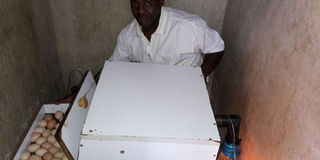All I need to hatch eggs in my simple incubator is a lamp

Ephantus Warui displays one of his innovative simple incubators powered by kerosene lamps. PHOTO | RACHEL KIBUI | NATION MEDIA GROUP
What you need to know:
- Warui, an agricultural engineering diploma graduate from Rift Valley Institute of Agriculture and Technology, also makes the incubators for sale, a venture he started in 2014.
- He places a plastic tray (usually a bucket lid) under the drawer that hosts the eggs to maintain humidity in the gadget.
A thermometer comes in handy in ensuring the correct temperature is maintained. - Warui hatches some 250 chicks a month and sell one-day-old ones at Sh90 while month-old chicks go for Sh400 each.
Ephantus Warui opens a white wooden box on his farm in White House estate in Nakuru town to reveal tens of eggs.
Looking at the box made of block wood, one may think that it is an egg storage facility.
But this is one of his four incubators, which run on kerosene, and he uses it to hatch eggs for sale.
Warui, an agricultural engineering diploma graduate from Rift Valley Institute of Agriculture and Technology, also makes the incubators for sale, a venture he started in 2014.
“This incubator hosts 90 eggs and I expect them to hatch in 10 days,” he says.
Each of the eggs is marked ‘A’, and Warui explains this helps him to avoid confusion when turning them.
“I turn the eggs after every 12 hours, therefore, marking makes my work easier and accurate.”
Warui says he learnt several basics of an incubator in school and through online searches that enabled him come up with the gadgets, after being unable to acquire the factory made ones.
“One lesson I picked is that from day one to 18, the temperature should be set at 37.8 degrees Celsius and humidity at 60-65, and then at day 18 (three days to hatching), one should adjust temperature and humidity to 37.5 degrees and 70-75 per cent respectively.”
One further needs to have healthy hatching eggs. “I use block boards to make the outer part of the incubator and the coffee tray mesh wire to make the base in a drawer where the eggs are placed,” he explains.
WELL VENTILATED ROOM
Other parts include an iron metal rod, on which he connects the kerosene lamp to heat the eggs inside the incubator.
For the eggs to hatch, he uses kerosene worth Sh350, about six litres at the current market price.
He places a plastic tray (usually a bucket lid) under the drawer that hosts the eggs to maintain humidity in the gadget.
A thermometer comes in handy in ensuring the correct temperature is maintained.
“The outside temperature can also cause a rise in incubator temperature. If it is high, I normally reduce the heat from the small lamp by winding down the wick as I monitor every three hours. At night I check at least twice,” says Warui, who adds that he has hatched over 1,000 chicks with the gadget, which must be placed in a room that is well-ventilated.
Warui has so far made 17 incubators of 30 to 90 eggs capacity but sold only 10 at between Sh9,000 and Sh13,000 mostly to friends and relatives.
Eunice Wangari, a poultry farmer from Bahati, Nakuru, says she bought the 90-egg capacity gadget five months ago.
“The first time I used it, I lost 10 eggs of the 90 I incubated and the number has reduced to three in the last hatching. To me the hatch rate is good and the machine is better than having hens brood eggs.”
MANUAL OPERATION
Warui hatches some 250 chicks a month and sell one-day-old ones at Sh90 while month-old chicks go for Sh400 each.
“I also use the machines as a brooder. When the eggs hatch, I remove the chicks and shells and spread old newspapers inside and put the chicks there for two weeks. I maintain the temperature at 28 degrees Celsius by adjusting the lamp,” says Warui, who doubles as a fuel pump installer and worked at the Pyrethrum Board of Kenya in late 90’s before quitting to work as an independent consultant.
One challenge of the machine, he notes, is that it is manually operated. He, therefore, has to keep checking on temperature.
“This makes me wake up at night to check it to avoid losses. Also, I have to keep checking on the kerosene level and refilling it.”
Dr Githui Kaba, a veterinary doctor in Nakuru County, says innovation is key in the sector if small farmers are to make money from their ventures.





